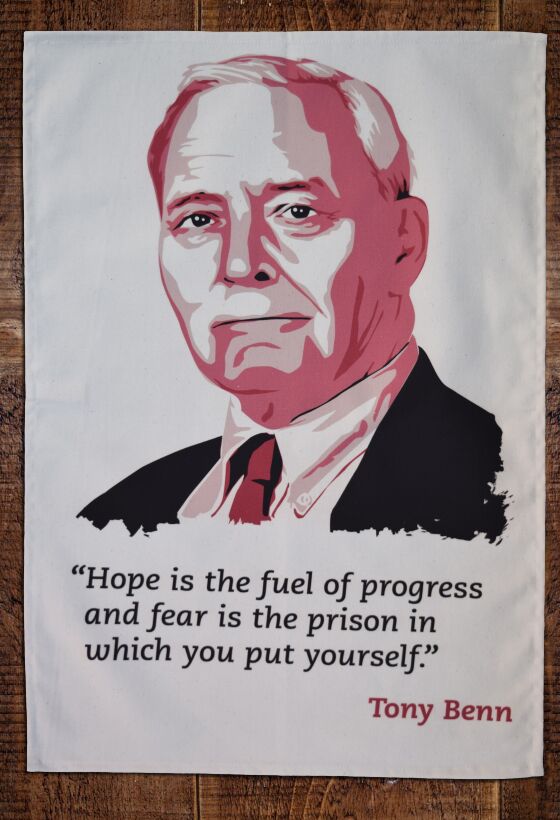A Legend of the British Left: Tony Benn and the Fight for World Peace
Posted by Pete on 3rd Apr 2019
Tony Benn was a legend of the British left. His lifelong battle to uphold the values of international justice and human dignity deserve a special degree of recognition. As does his unwavering commitment to peace.
In the early summer of 1945, with Nazi Germany recently defeated, a young British Royal Air Force pilot heard Laurence Olivier's voice booming over the radio:
“We the Peoples of the United Nations, determined to save succeeding generations from the scourge of war which twice in our lifetime has brought untold sorrow to mankind, and to reaffirm faith in fundamental human rights, in the dignity and worth of the human person…”
Olivier was reading the preamble to the United Nations Charter, newly agreed by the Allied powers.
The RAF man listening was a 20 year-old volunteer named Anthony. He’d soon enough come to be known as ‘Tony’, though – Tony Benn.
Benn's turn to the left
Benn, who was born on 3rd April 1925, was one of the most inspirational figures in the entire political history of these islands.
Against a barrage of abuse from corporate-backed British media, Benn spent the final decades of the 20th century and the beginning of the 21st fighting to realise a fearlessly democratic and prosperous vision for Britain and the world.
From the 1980s onwards, with the Labour Party turning to the right, Tony Benn became the only frontline political alternative to the long tail of Thatcherism.
But until the 1970s, he had been more of a ‘soft left’ figure in the British labour movement – a loyal minister of the wily old moderate, Harold Wilson.
Benn's left turn has been given a few explanations over the years.
Wilson - whose management of Labour was ruffled by Tony’s increasingly socialist positions - famously blamed Benn’s supposed tendency to “ immature with age”!
And Tony himself explained his turn toward the left as a reaction to his experiences as a Cabinet minister from 1964-70, when he saw just how constrained the elected British government is by unelected forces like the corporate press, big business, and global institutions like the International Monetary Fund.
But perhaps the leftward political voyage of Tony Benn started earlier, going all the way back to that young RAF pilot listening to Laurence Olivier read the UN Charter in 1945.

Tony Benn as a leader on Human Rights
Soon followed by the Universal Declaration of Human Rights in 1948, these founding documents of the UN gave Benn a lifelong faith in the mission and values of the United Nations.
His childhood had been spent hearing about fascist warmongers like Hitler and Mussolini in the news, and then his teenage years were spent fighting them in the skies.
As such, these UN declarations which rang out over a world devastated by war would have given a young Tony real hope that a new age was about to emerge out of the ruins – one of democracy, equality, and international peace.
Over the coming decades, Benn watched as his country and those it rubbed shoulders with betrayed the idealism of those heady post-war days time and again.
First came the failure to dismantle Britain’s brutal colonial apparatus.
For all the progressive strides it made at home, Clement Attlee’s 1945-51 Labour government refused to decolonise outside of India – though not with Tony Benn’s support (he became an MP for the first time in 1950).
As a member of the Left-wing ‘Movement for Colonial Freedom’, Tony pushed for Britain to respect the UN principle of national self-determination and quit its colonies.
Britain’s close relationship with Apartheid South Africa – a regime which to its core insulted the basic UN value of human equality – was another of Benn’s targets.
Benn as a figurehead of the world peace movement
He was also a constant feature in the opposition to Britain’s modern wars.
Benn argued against Thatcher’s vain military adventure to the South Atlantic in 1982, saying it was a waste of human life and that the dispute over the Falkland Islands should be resolved peacefully through the UN.
As for Tony Blair’s various military campaigns in the Middle East, Benn challenged them at every turn.
In one of the best of his many great speeches to the Commons, when Blair was about to start bombing Iraq in cahoots with Bill Clinton in 1998, Tony Benn appealed to the moral conscience of his fellow MPs:
“Aren’t Iraqis terrified? Don’t Iraqi women weep when their children die? Every Member of Parliament tonight who votes for the government motion will be consciously and deliberately accepting responsibility for the deaths of innocent people.”
Tony Benn, the RAF veteran, understood the price of war – and thus knew, firsthand, the value of peace.
If more people in positions of power and influence were as willing to stand up for peace and fundamental human rights as Benn was throughout his lifetime, then we’d surely have a better world.
Today's leaders, take note.
Check out our designs honouring Tony Benn and other brave radicals
